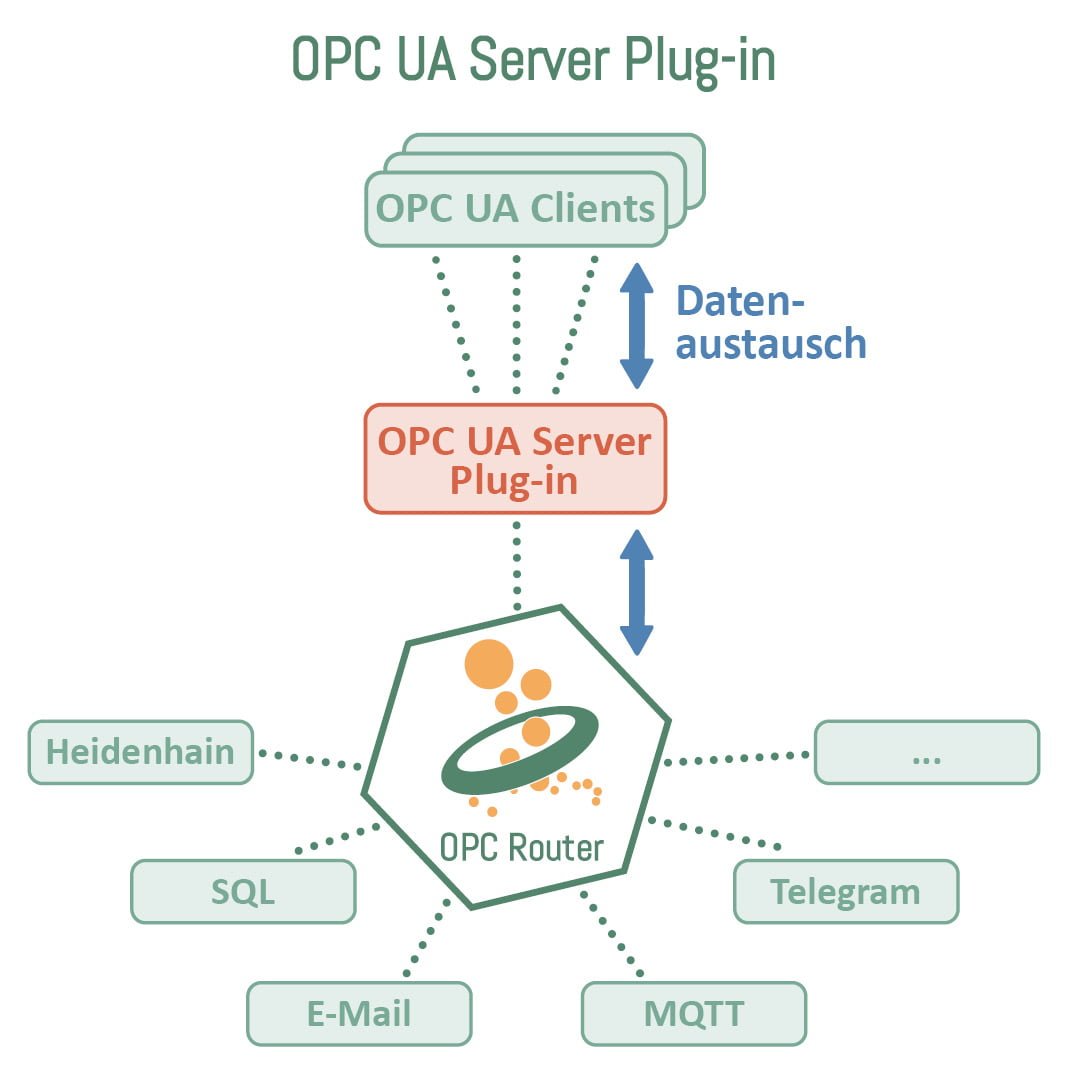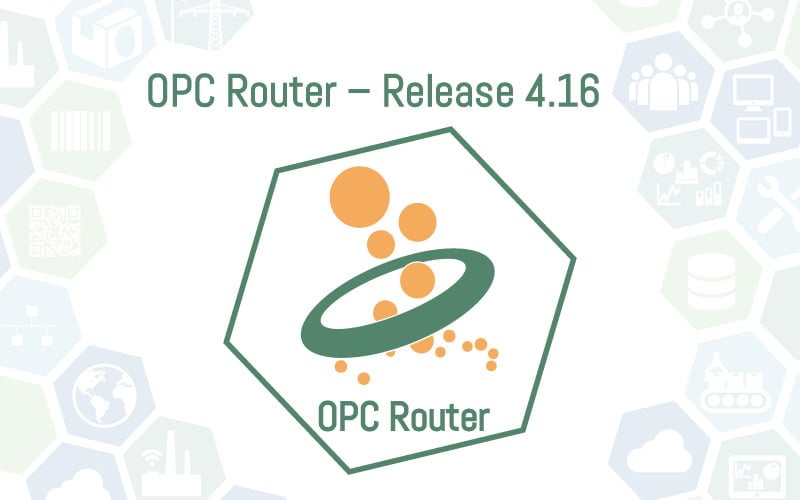Der neue OPC Router bringt in Version 4.16 gleich zwei neue Plug-ins. Die Bandbreite an Anwendungen wird dadurch wieder einmal deutlich erweitert.
Wie gewohnt finden Sie den Download für die Testversion und alle relevanten Informationen in unseren Release-News:
OPC UA Server Plug-in – Der OPC Router stellt ab sofort auch Daten als OPC UA Server bereit
Das OPC UA Server Plug-in stellt die internen Variablen des OPC Routers als OPC UA Server zur Verfügung. Die Variablen sind dadurch über den OPC UA Zugriff lesbar und beschreibbar. Der OPC Router kommuniziert darüber nun auch direkt mit Systemen, die selbst nur als OPC Client agieren können. Die internen Variablen des OPC Routers können an beliebigen Stellen in Verbindungen verwendet werden. Je nach Anwendungsfall ist es so möglich, Daten von Systemen die per Plug-in angebunden sind (Heidenhain, Zebra Drucker (u.a.), SAP Systeme, SOAP Services, Datenbanken, etc. => s. Plug-in Liste) als OPC Datenpunkte bereitzustellen. Oder es werden Datenpunkte definiert, die von OPC Clients beschrieben und dann an Plug-ins weitergegeben werden (z.B. Email-Versand, Telegram-Message, Drucker, etc. => s. Plug-in Liste).

OPC Router Leistungs- und Statusdaten abrufbar
Neben den internen Variablen werden vom OPC Router automatisch auch Leistungsdaten bereitgestellt. Daten können zu Übertragungen (Anzahl und Datenmengen) der einzelnen Verbindungen abgerufen werden. Zusätzlich verfügt jedes Plug-in über eigene Status-Datenpunkte zur Überwachung des Zustands.
Sichere Implementierung mit Zertifikaten und Benutzern
Der interne OPC UA Server des OPC Routers verfügt über die standardmäßigen Sicherheitsmechanismen für einen sicheren Betrieb in der Automatisierungsumgebung. Der Zugriff auf die Datenpunkte und den Server wird über Zertifikate und Benutzer-Authentifizierung geregelt.
OPC UA Method Trigger
Neben den reinen Datenpunkten implementiert der neue interne OPC UA Server auch OPC UA Methoden. Diese in OPC UA neue Möglichkeit, erlaubt es im Datenpunktraum Methoden zu definieren, welche vom OPC Client mit Eingabeparametern aufgerufen werden und der Client erhält nach Ausführung der Methode definierte Rückgabewerte und das Ausführungsergebnis zurück.
Die Methode stellt sich im OPC Router als Trigger einer Verbindung dar. Die Eingabewerte können in der getriggerten Verbindung abgerufen und mit beliebigen Plug-ins in gewohnter Weise verschaltet werden. Die Rückgabewerte erhalten Ihre Werte dann direkt in der Verbindung und nach der Ausführung der Verbindung meldet der Trigger dem OPC Client die Werte zurück.
Die so definierte Methode gliedert sich in den hierarchischen Namensraum des internen OPC UA Servers ein.
Network File Access Plug-in – Dateitransfer netzwerkweit
Mit dem neuen Network File Access Plug-in lassen sich netzwerkweite Dateitransfers automatisieren. Das Plug-in ist in der Lage FTP-Server über die gängigen sicheren FTP-Protokolle anzubinden und Windows Netzlaufwerke mittels Windows Credentials anzubinden. Zur Funktion gehört das Auslesen von Dateien, die Bereitstellung der Dateninhalte in Verbindungen, das Erstellen von Dateien und das Füllen von Dateien mit Inhalten aus den OPC Router Verbindungen.
Daraus ergeben sich verschiedene Anwendungszenarien:
Dateitransfer
Ist das Datei-erzeugende System nicht auf demselben Host wie das konsumierende, kann der OPC Router als transferierende Middleware aufgesetzt werden. Der OPC Router hat mit FTP und SMB Zugriff auf die gängigsten Fileserver-Systeme und ist damit der ideale Sammler und Verteiler für Dateien. Über das Monitoring kann jeder Dateitransfer im einzelnen geprüft werden. Bei Bedarf können die Dateien vom OPC Router sogar zusätzlich an anderen Stellen abgelegt oder auch die Inhalte ausgelesen und zu Monitoring-Zwecken in Datenbanken gespeichert werden. Wird im späteren Verlauf eines der beteiligten Systeme getauscht und eine neue Schnittstellentechnik verwendet (SQL, REST, SOAP, SAP, o.ä.), kann dies einfach durch Anpassung der OPC Router Verbindung umgesetzt werden, ohne die anderen Systeme zu modifizieren.
Dateiverarbeitung
Systeme, welche Dateien mit Daten zu weiteren Verarbeitung ablegen, finden sich noch immer in der IT-/OT-Landschaft. Mit dem neuen Network File Access Plug-in können diese Dateien vom OPC Router eingelesen und mit Hilfe der integrierten Transfer-Objekte für JSON, XML und CSV verarbeitet werden. Die Daten werden dann mittels der vielen anderen Plug-ins in die Zielsysteme übergeben.
Dateibereitstellung
Neben Datei-erzeugenden Systemen finden sich auch weiterhin Systeme, die Daten per Datei übergeben bekommen müssen. Für diese Systeme dient der OPC Router mit dem Network File Access Plug-in als Konverter von z.B. SQL, REST, SOAP, SAP o.ä. in Datei. Daten werden auf beliebige Trigger hin aus den Quell-Plug-ins gelesen und in die Zieldatei geschrieben bzw. angehängt, wenn die Datei schon vorhanden ist (konfigurierbar).
Zebra Drucker Plug-in jetzt mit Drucker-Status Abfrage
Das Zebra Drucker Plug-in erhält im aktuellen Release 4.16 des OPC Routers eine wichtige neue Funktion. Es ist ein neues Transfer Objekt verfügbar, welches die Status-Werte des Zebra Druckers abruft. Über das neue Objekt kann in einer Verbindung vom Drucker abgefragt werden, ob er online ist, ob er einen Fehlerzustand hat oder ob genug Papier vorhanden ist und viele andere Informationen mehr (u.a.: PaperOut, Pause, LabelLength, BufferFull, DiagnosticMode, HeadingUp, RibbonOut, ThermalTransfer, PrintMode, LabelWaiting, LabelRemaining). Damit werden Zebra Drucker nicht nur zur reinen Datenversorgung angebunden, sondern auch die Betriebsbereitschaft ist jetzt verfügbar und kann in die Industrie 4.0-Infrastruktur aufgenommen werden. Dies ermöglicht es, sofort auf kritische Situationen zu reagieren.
Erweiterungen bei den internen Variablen
Auch bei den internen Variablen gibt es neue Änderungen. Mit dieser neuen Version verfügen interne Variablen nun über die Möglichkeit, als Array angelegt zu werden. Die Variable wird dafür einfach als Array markiert und steht damit als solches in den Verbindungen zur Verfügung.
Testen Sie jetzt den OPC Router!
Erhalten Sie den Link zum aktuellen OPC Router und verpassen Sie keine der Produkt-Neuerungen.

